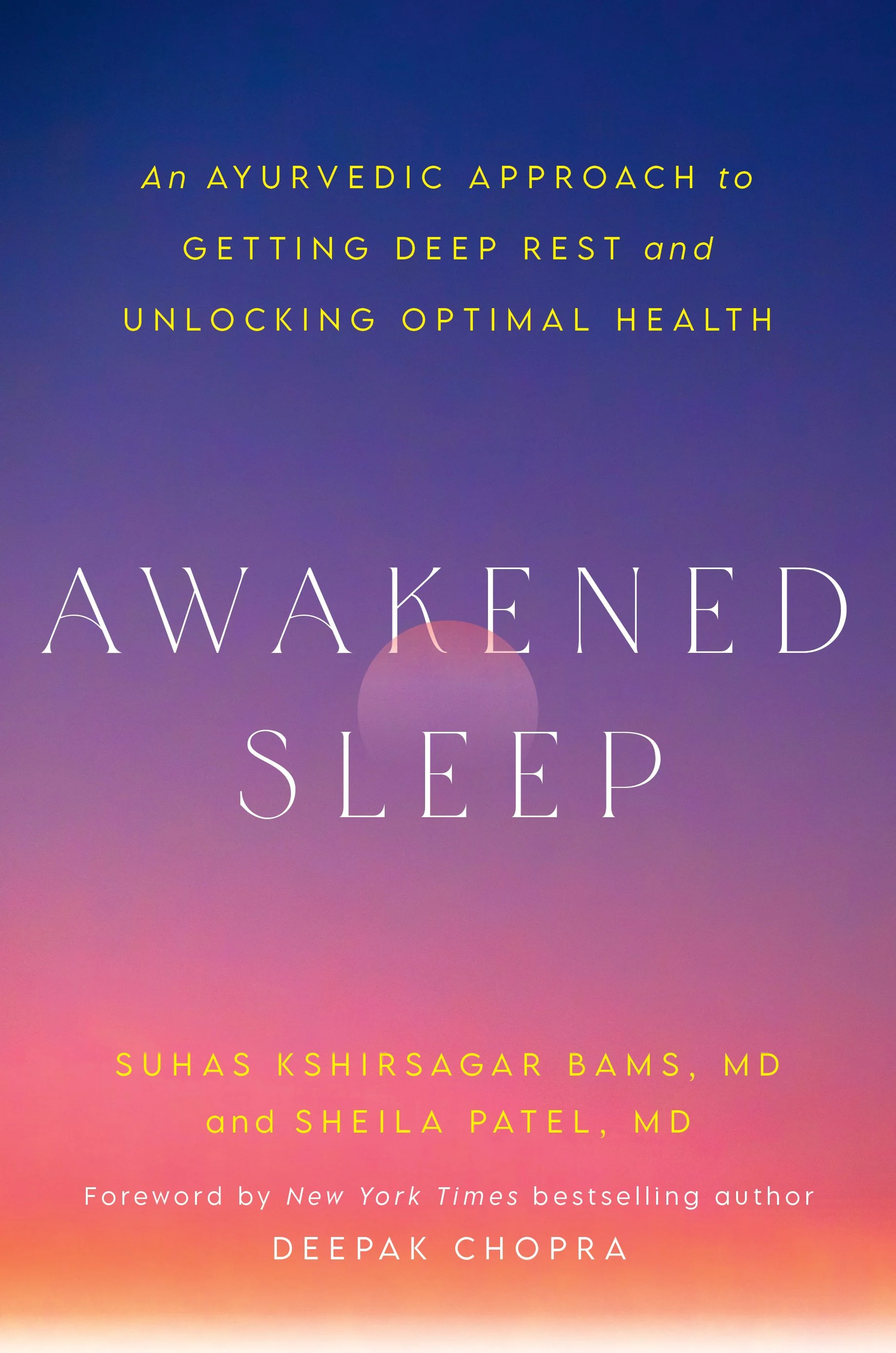Sleep Isn’t Just Physical Rest
We often think of sleep only as a physical necessity: a way for the body to rest, reset, and prepare for another busy day. And while that’s certainly true, it’s only part of the picture.
In Ayurveda, sleep is more than just the absence of wakefulness. It’s a sacred act, an active process of connecting to natural rhythms and of healing. Sleep is a bridge between our inner and outer worlds, and is one of the three pillars of health alongside food and movement. Sleep is an opportunity to turn our senses and awareness inward and release the stories and stress of the waking world. We not only heal physically, but also emotionally. It can even act as an extension of meditation, allowing us to connect to our true nature. When we begin to see it this way, and treat it this way, everything shifts.
You're Not Broken—You're Just Disconnected
So many of my patients come to me saying, “I slept eight hours, but I still feel exhausted.” This tells me that although their body is in bed and their eyes are closed, there is something interfering with the natural stages of deep sleep and dreaming and the healing that occurs during all the stages of sleep. The key is figuring out, for each individual, what is disconnecting us from our natural sleep process.
Ayurveda offers many insights when it comes to getting restorative sleep, insights that are being validated by sleep science. Ayurveda teaches us that the quality of our sleep depends on the quality of our day. Establishing a balanced lifestyle, starting from the moment you wake up and take in the morning sunlight, will facilitate healthy sleep at night. Even a full night of sleep won’t bring the restoration you need if your mind and body haven’t prepared for it properly during the day. Unfortunately, we live in a culture that prioritizes productivity and activity and creates an overstimulated state, at the expense of our sleep.
Although most people tend to focus on the number of hours of sleep they get, here’s what I tell them: if you wake up tired, it’s not just about how many hours you slept; it’s about the quality of that sleep and how aligned your sleep is with natural rhythms. When it comes to our natural rhythms, Ayurveda describes several biological principles, or doshas, that govern what happens physiologically during the night. The hours of 10:00pm to 2:00am are known as Pitta time. When we are asleep during this time, we are getting the majority of our deep sleep during which cellular metabolism, liver detoxification, tissue repair, and memory consolidation occur. Between the hours of 2:00am to 6:00am, when Vata dosha dominates, we do the majority of our dreaming. Dream sleep allows us to process emotional memories, create mental clarity, and improve brain functioning. This is an active time of night, in fact some research suggests that we use more energy during dreaming than we do during the day!
Obviously, we don’t want to miss out on these important nighttime functions. So, what is interfering with us getting ideal sleep? Let’s take a deeper look at some of the subtle saboteurs of sleep—and how to begin reclaiming your rest.
1. Overstimulation of the Senses
One of the most common sleep disruptors is sensory overstimulation. This includes our screen time, not only in the 2-3 hours before bed, but throughout the entire day. Visual information that we are processing while staring at screens can create overstimulation of the nervous system as it can become overwhelmed by the amount of information coming in. And when we are on screens at night, in addition to creating an overstimulated mind, the blue light emitted from phones, tablets, and TVs suppresses melatonin, the hormone that signals to the body that it’s time to sleep.
From an Ayurvedic perspective, sensory overstimulation such as screen time, news watching, or even working under bright lights stimulates vata and pitta doshas and disrupts the body’s ability to slow down and transition into rest. Even five to ten minutes of overstimulation before bed can disturb the subtle preparation the body undergoes before entering sleep. That’s why one of the first practices I teach is mindful sensory input—reducing what you take in, especially through the eyes and ears, or choosing input that is calming and relaxing. Eliminating excessive screen time and loud noise throughout the day allows the nervous system to calm down more easily for a good night's sleep and keeps the doshas balanced. When we have excess pitta dosha, we can wake up feeling hot, with acid reflux, or a ‘to do’ list swirling in our mind. When vata dosha is out of balance, we can feel restless, focus on worries, or have frequent awakening, especially between the hours of 2:00-6:00am. By reducing overstimulation of the senses, we keep the doshas balanced and performing their normal functions at night.
2. Late-Night Eating and Impaired Digestion
In Ayurveda, the process of digestion involves a concept known as agni, our digestive ‘fire’, related to pitta dosha. When we eat late, within 3-4 hours of sleep, the heat created from digestion increases pitta and can activate us, making it more difficult to sleep. As many patients will attest, this heat can show up at night as acid reflux, hot flashes or heat intolerance, or even inflammation. In addition, when our digestive fire is working to digest food in the gut, it is not performing its cellular functions optimally, such as cellular repair and detoxification. The result? You wake up groggy, feeling heavy or bloated, and mentally foggy, even if you technically got enough hours.
Instead, aligning your last meal with the sun—ideally before 7 p.m.—allows your system to shift from digestion to restoration at night. One small change in timing can have a profound effect on how you feel in the morning.
3. Unprocessed Emotions and Energetic Residue
This may be the most important obstruction to restful, restorative sleep—and the one we most often overlook. Many patients don’t relate their sleep issues to stored, unresolved emotions, and because it can be uncomfortable to do emotional work, they too often ignore this major disruptor of restful sleep.
If we move through the day, and our life, without taking time to reflect, feel, and release emotions, they are stored in the body as residual energetic impulses. This stored energy is then expressed through the nervous system, the gut, and other tissues in the body. At night, unresolved emotions can emerge—as restlessness, anxiety, or disturbing and vivid dreams, all signs of imbalance of vata dosha. This most often causes waking at 2–4 a.m. which is the vata time of night. Practices like journaling or gentle breathwork before bed can help release emotions and stress. In addition, an Ayurvedic practice that has helped many of my patients is performing a warm oil foot massage before bed using coconut or sesame oil. These practices, by moving stuck emotional energy, calming the nervous system, and balancing vata dosha, can transform the quality of sleep and facilitate deep rest and healing.
In sleep science, research has shown that people who have had traumatic experiences, especially during childhood when we aren’t taught how to process these experiences and the associated emotions, are more likely to have disrupted sleep and sleep disorders. And when we don’t sleep, we have less emotional regulation, and further sleep disruption. Often by working with behavioral health professionals or going through guided emotional clearing processes, people truly restore and heal. I have seen this happen with many of my patients once they become aware that this is the causative factor of their sleep issues and address it.
The Ayurvedic Path to Restorative Sleep
When we begin to shift our relationship with sleep—not as something we "achieve," but as a return to our natural state of being, we can fully tap into our healing potential, physically and emotionally. By removing what is disconnecting us from natural sleep, we awaken to our highest potential while we sleep, which then improves the quality of our days.
In our new book, Awakened Sleep, Dr. Suhas Kshirsagar and I offer a full framework rooted in both Ayurveda and modern science to help you discover what is interfering with your sleep, create rituals that support and balance the doshas, and reconnect with natural, restorative sleep–awakened sleep.
In addition to the topics already covered, you can also explore:
Understanding your dosha sleep type and how it influences your sleep tendencies
Discovering what doshas are out of balance and the root causes
Restructuring your sleep-wake cycle to align with biological rhythms
Creating morning and evening rituals tailored to you
Clearing emotional blocks that disrupt deep rest
Because when we sleep well, we live well. And when we reclaim sleep as sacred, we experience optimal physical, mental, and spiritual wellbeing.
Wishing you awakened sleep,
Dr. Sheila
Learn More
My new book, Awakened Sleep: An Ayurvedic Approach to Getting Deep Rest and Unlocking Optimal Health, is available for preorder now. It’s the culmination of decades of clinical work, ancestral wisdom, and my heartfelt belief that healing begins with rest. I can’t wait for you to read it.

